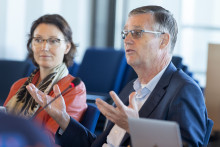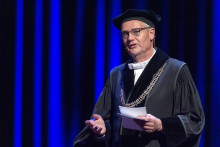Earlier this year, the Young Academy Twente came up with an advice on expanding promotion rights, the so-called ius promovendi. However, that advice fell on deaf ears. Due to a change in the law in 2017, all assistant professors (UD) and associate professors (UHD) in the Netherlands have the right to act as formal supervisor of a PhD candidate, provided they have been granted that authority - the ius promovendi.
Recognition and rewards
In view of the recognition and rewards movement, among other things, the Young Academy Twente argued for an extension of the doctoral right; if a UD or UHD does most of the work in supervising a PhD candidate, in the majority of cases at the UT, that person remains 'co-supervisor'; ultimately, only the name of the first supervisor - the professor - appears on the front of the dissertation.
Such limited promotion rights hinder the recognition and rewarding of UDs and UHDs, the University Council now agrees. The council went into 'open discussion' with rector Tom Veldkamp on the subject behind closed doors last month. In addition, the council puts forward similar arguments as the Young Academy Twente against the current situation: it allows dependency and abuse, does not necessarily foster the quality of supervision, deviates from procedures outside the Netherlands and does not recognise that someone with the right of promotion always has the right expertise to supervise a PhD candidate.
Bottleneck
The council presented these arguments to the rector last month, hoping that the current policy would be reviewed. However, the Uraad received a negative response. The rector was said to have expressed concerns about the 'sustainability' of substantially expanding promotion rights and the impact on the UT's human resources policy.
Moreover, the council observed a 'bottleneck' in the Doctorate Board, which is chaired by the rector and includes all deans. In its own words, the council found out that 'only a minority of deans are against extending the promotion rights'. The council subsequently writes it left the discussion 'with the feeling that the opinion of a few stands in the way of clear benefits for a majority of academic staff'.
'Figures put discussion in different perspective'
This is why the council wanted clarification from the rector during the plenary meeting with the Executive Board on Wednesday morning: had he changed his mind? That turned out not to be the case. Veldkamp came up with 'interesting numbers' in support: he mentioned that of the 410 individuals at UT with promotion rights, 77 are not supervising PhD students. In comparison, according to the rector, the majority of UDs and UHDs without PhD rights also do not supervise PhD students: of the total 714 UDs and UHDs without promotion rights, 608 do not supervise any PhD candidates, the rector's figures show.
'We did not have these numbers at the earlier meeting, but we do now. That puts the debate in a different perspective,' the rector said. 'So we are talking about a relatively small group, but at the same time that is a relevant group.' Asked whether he would review his position on promotion rights for that group, Veldkamp did not immediately respond positively. 'We must have the right checks and balances; the supervision must be of good quality and we must guard the workload of a supervisor. Moreover, someone should not be put under too much pressure to supervise a PhD student. That is a balancing act. Then - if we were to extend the ius promovendi - we have to implement it properly in our HR policy and in our vision on recognition and rewards.'
Veldkamp promised to discuss the issue within the Doctorate Board. The council then protested that such decision-making was taking place 'not transparently' and behind closed doors, but had to concede that Veldkamp would come up with a decision 'after the summer break'.






